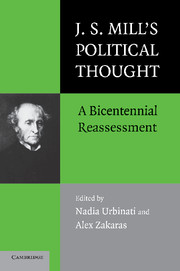Book contents
- Frontmatter
- Contents
- List of Contributors
- Introduction
- PART ONE LIBERTY AND ITS LIMITS
- PART TWO DEMOCRACY AND THE INDIVIDUAL
- 6 Bureaucracy, Democracy, Liberty: Some Unanswered Questions in Mill's Politics
- 7 Mill in Parliament: When Should a Philosopher Compromise?
- 8 John Stuart Mill, Individuality, and Participatory Democracy
- 9 Mill's Neo-Athenian Model of Liberal Democracy
- 10 John Stuart Mill on Education and Democracy
- PART THREE BEYOND NATIONAL BORDERS
- Bibliography
- Index
7 - Mill in Parliament: When Should a Philosopher Compromise?
Published online by Cambridge University Press: 08 January 2010
- Frontmatter
- Contents
- List of Contributors
- Introduction
- PART ONE LIBERTY AND ITS LIMITS
- PART TWO DEMOCRACY AND THE INDIVIDUAL
- 6 Bureaucracy, Democracy, Liberty: Some Unanswered Questions in Mill's Politics
- 7 Mill in Parliament: When Should a Philosopher Compromise?
- 8 John Stuart Mill, Individuality, and Participatory Democracy
- 9 Mill's Neo-Athenian Model of Liberal Democracy
- 10 John Stuart Mill on Education and Democracy
- PART THREE BEYOND NATIONAL BORDERS
- Bibliography
- Index
Summary
The parliamentary career of John Stuart Mill offers a unique opportunity to observe the tension between theory and practice in the public life of a philosopher-politician. Mill is one of the few political philosophers in modern times to have held national political office, and the only one to have won a legislative seat after publishing theoretical works that proposed practical reforms. The aim of this chapter is to see what can be learned from that career about the challenges a philosopher who goes into politics faces, and more generally about the challenges a politician of principle confronts in turning theoretical commitment into legislative action. The inquiry is partly interpretive: to what extent did Mill modify his principles for political benefit? It is also normative: to what extent should Mill have modified his principles? The answers to the normative question, suitably generalized, suggest some criteria for assessing the compromises that principled legislators make in any democratic polity.
Mill is an apt subject for such an inquiry not only because he was a major theorist, but also because he was known as, and took pride in being known as, an independent thinker who promoted progressive reform. He espoused unpopular positions – some far ahead of his time, such as women's suffrage, and some opposed even by his own allies, such as the recognition of land claims of Irish tenants. He did not aspire to be a politician and won his seat in Parliament without conducting a conventional campaign.
- Type
- Chapter
- Information
- J.S. Mill's Political ThoughtA Bicentennial Reassessment, pp. 166 - 199Publisher: Cambridge University PressPrint publication year: 2007
- 9
- Cited by



